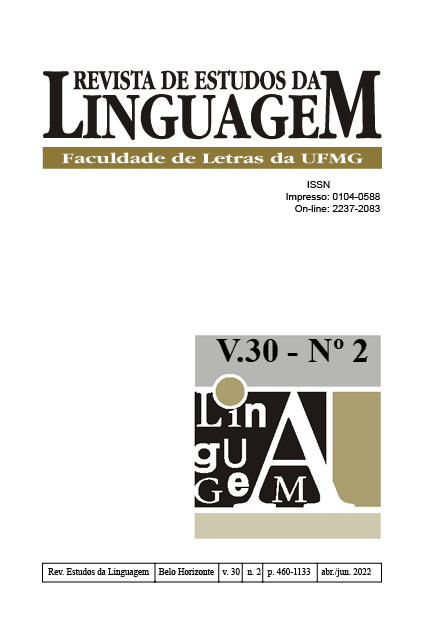O domínio da concessão
uma análise baseada nos usos de construções oracionais com mesmo que, ainda que e se bem que
DOI:
https://doi.org/10.17851/2237-2083.30.2.997-1031Palavras-chave:
construções oracionais adverbiais, concessão, articulação de oraçõesResumo
O artigo trata de uma análise de três construções similares na forma e na função: as orações adverbiais iniciadas por ainda que, mesmo que e se bem que, que tradicionalmente são consideradas orações adverbiais concessivas. A partir do princípio da não-sinonímia (GOLDBERG, 1995), considera-se, nesta pesquisa, que tais construções, embora sejam do mesmo domínio semântico, apresentam diferenças contextuais. A partir de um conjunto de fatores linguísticos, comparam-se os usos de orações adverbiais iniciadas por esses conectivos. O trabalho utiliza os pressupostos teórico-metodológicos da Linguística Funcional Centrada no Uso (LFCU), que considera, em suas análises, os pressupostos funcionalistas norte-americanos, a abordagem construcionista baseada no uso e ainda outras abordagens, como a da sociolinguística variacionista. A nossa pesquisa, voltada para questões sincrônicas, busca verificar as motivações para os usos de construções adverbiais com valor básico concessivo. O modelo construcional que instancia as cláusulas adverbiais é [CONECT (S) V (C)]CLÁUSULA ADVERBIAL. A pesquisa baseou-se na coleta e na análise de trezentos dados de construções oracionais adverbiais, sendo cem iniciadas com ainda que, cem com mesmo que e cem com se bem que, todos os dados extraídos da aba Web do Corpus do Português. A partir de um conjunto de fatores linguísticos, o trabalho se volta para a questão da variação, sobretudo no que se refere à análise das relações horizontais entre subesquemas. Os principais resultados apontam para diferenças nos usos principalmente em decorrência da maior ou menor subjetividade e da maior ou menor força de articulação de cada subesquema oracional e oração matriz.





